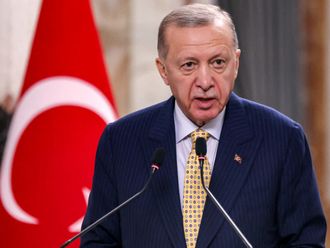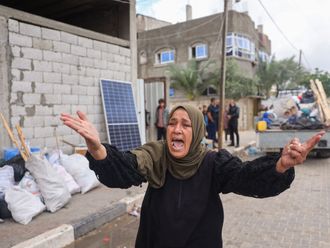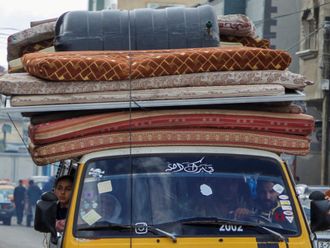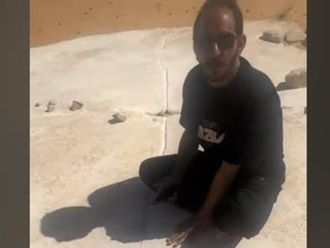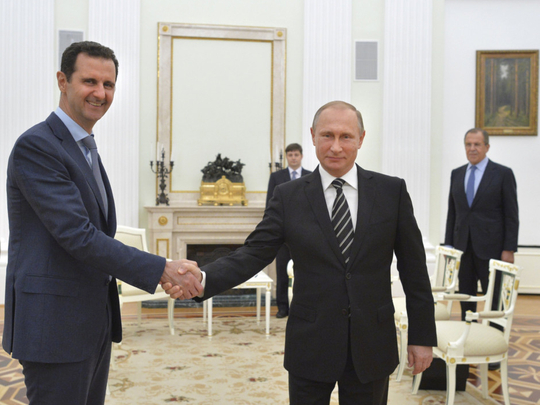
Beirut: Militarily, the upcoming year will witness more aggressive Russian involvement in the Syria War, taking over entire towns and cities either through fierce battles or deals with Syrian rebels. Russian President Vladimir Putin sent his troops to the Middle East with one objective: winning in Syria.
They did not come in order to pack up and leave within the coming months and nor are they here to share power with the Turks and Saudis.
A rumour is making the rounds that Putin will visit his troops at the Hmaymeem Military Airport on the Syrian coast on Russian Christmas (January 7). He did it last August when he paid a surprise visit to Russian-annexed Crimea, whipping up grand tension in eastern Ukraine.
Putin’s message to his troops — and the world — is clear: Russia is back in the Middle East and it intends to stay. The massive deployment of arms, planes, and military personnel since last September is an indicator that these Russian bases are not temporary and will not be dismantled and shipped back home anytime soon. Three months after Russian operations started, the year closes with the Syrian Army regaining mountains lining the Syrian coasts and entire chunks of rebel-held territory around Aleppo.
2016 will likely be when a deal is hammered out in Ghouta, the agricultural belt surrounding Damascus that has been held by Syrian rebels since 2012.
After a Russian air strike killed top rebel commander Zahran Alloush on Christmas Day, rebel fightershave been in disarray.
They are expected either to bicker among themselves, collapse and surrender, or reach a deal with the Damascus government, like the one reached recently in the midland city of Homs and the rural town of Zabadani.
Both called for the safe exodus of all rebel militias to opposition-controlled cities of Deir Al Zor and Raqqa.
As the year kicks off, the Syrian Army backed by Russian air power is rumbling south towards Deraa on the Syrian-Jordanian border, finishing off the most eminent threat to the Syrian capital.
Meanwhile, a deal is under way that will likely see the light in early January calling for the exodus of fighters in cities and towns around Damascus.
Also on 25 January 2016, UN-sponsored talks between the Syrian government and its opponents will kick off in Geneva, “Syrianising” any international deal reached by major stakeholders on their behalf.
The details, at a micro-level, will be handled by the Syrians themselves.
The political process, approved last October in Vienna, calls for a Syrian-led negotiating process for six months that leads to a new government and the drafting of a new constitution for Syria.
A 2016 benchmark will be next May when the tenure of Syria’s current Baath-packed Parliament expires. There are differences on the limits of power of the new government.
The opposition is pointing to Geneva I, saying that it ought to be a Transitional Government Body (TGB) that takes over all presidential powers from Bashar Al Assad.
Russia and Iran reject such a formula, calling instead for a “cabinet of national unity” that runs the country with Al Assad.
The transitional period ends when early presidential elections take place in the summer of 2017. Nothing has changed in the pro-regime camp; they still firmly hold on to the notion that Al Assad can run for another term 18-months from now.
The Saudis and Turks have also not changed their insistence on Al Assad’s departure, but the real change is seemingly in the United States.
Regardless of what is said in public, the Obama Administration is adjusting to Russian ambitions in the Middle East.2016 will be a presidential election year in the United Nations. Nobody in Washington D.C. will have time for the Syria War, delaying it until a new president is sworn-in in January 2017. By then Putin hopes to have only two players left on the Syrian battlefield: the Syrian Army and Daesh. He hopes to put the next US President in front of two difficult choices: Al Assad or Abu Bakr Al Baghdadi.



